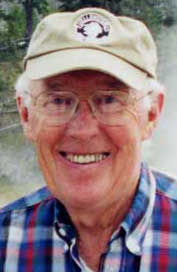Thomas D. Brock
| Thomas D. Brock | |
|---|---|

Brock in July 2002, Yellowstone Park
|
|
| Born |
10 September 1926 Cleveland, Ohio, United States |
| Nationality | American |
| Fields | Microbiology |
| Institutions |
The Upjohn Company Case Western Reserve University Indiana University University of Wisconsin–Madison |
| Alma mater | Ohio State University |
| Doctoral advisor | William D. Gray |
| Known for | Thermophilic bacteria Thermus aquaticus |
| Notable awards | Golden Goose Award (2013) |
Thomas Dale Brock (born September 10, 1926) is an American microbiologist known for his discovery of hyperthermophiles living in hot springs at Yellowstone National Park. In the late 1960s, Brock discovered high-temperature bacteria living in the Great Fountain region of Yellowstone, and with his colleague Hudson Freeze, they isolated a sample they named Thermus aquaticus. "Life at High Temperatures", a 1967 article summarizing his research, was published in the journal Science and led to the study of extremophiles, organisms that live in extreme environments. By 1976, T. aquaticus was found useful for artificially amplifying DNA segments. Brock's discoveries led to great progress in biology, contributed to new developments in medicine and agriculture, and helped create the new field of biotechnology.
Thomas Dale Brock was born in Cleveland, Ohio, on September 10, 1926, the only child of Helen Sophia Ringwald, of Chillicothe, Ohio, and Thomas Carter Brock, of Toronto, Canada. Though Cleveland was an industrial city, his home was situated near a farm and forested park with views of Lake Erie, so that he grew up in an "idyllic environment", surrounded by nature.
Brock's father, who had never received a formal education, had encouraged Brock to pursue university, and taught Brock how to assemble electrical equipment. At the age of 10, Brock received a chemistry set as a Christmas present, and his father helped him set up a basement laboratory. When Brock was 15, his father became seriously ill, and the family moved back to his mother's home in Ohio. Months later, Brock's father died, leaving the family in a state of poverty. Brock immediately went to work for $0.25 per hour to support himself and his mother in various odd jobs.
...
Wikipedia
